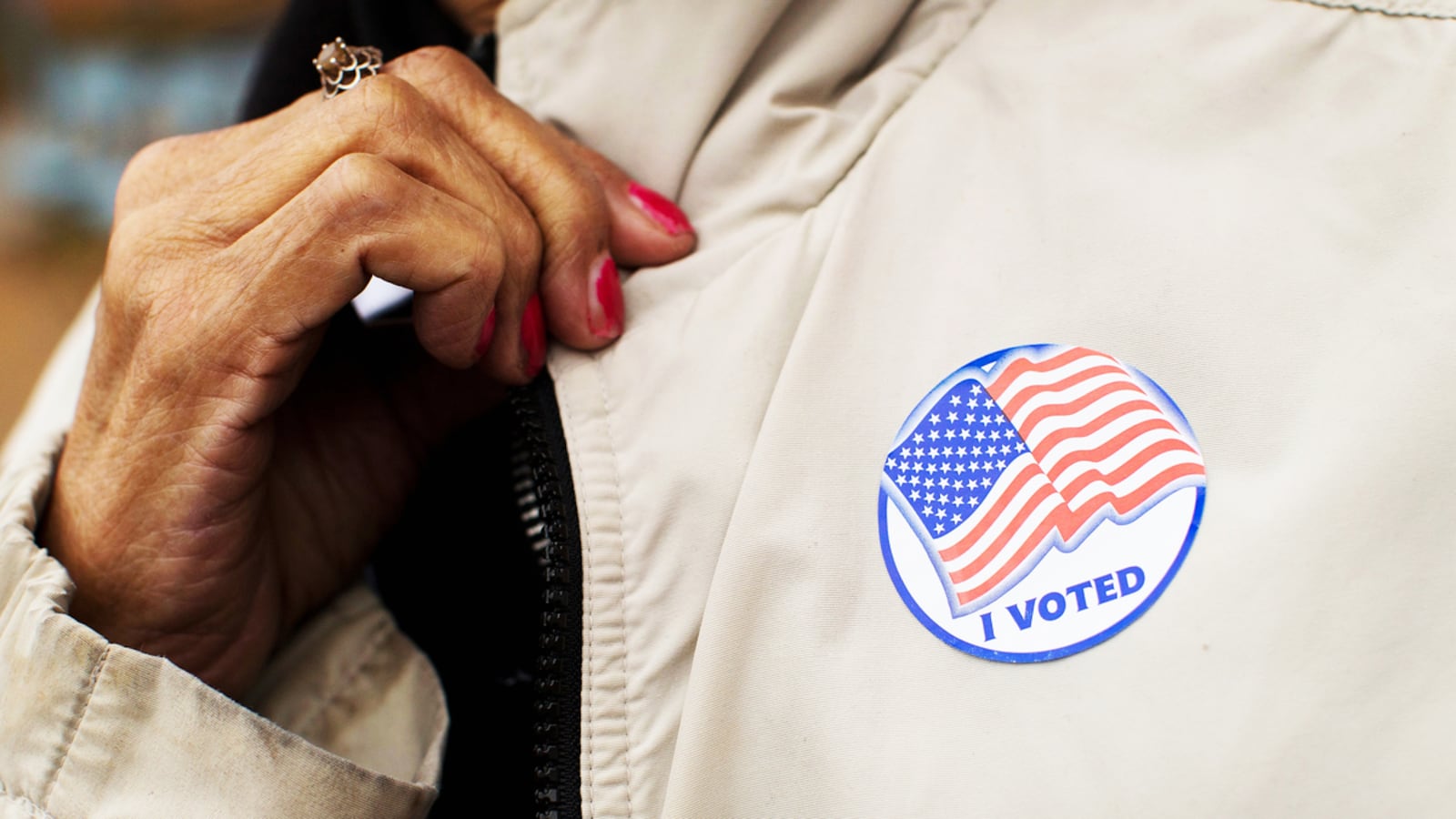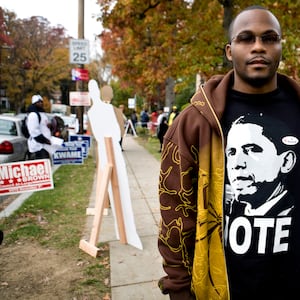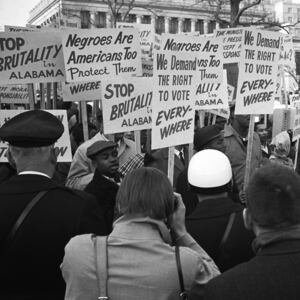There was already a decades-high pile of evidence proving Republicans oppose democracy before the House took up the Voting Rights Advancement Act last week. The partisan vote on the bill—which saw nearly every Republican refuse to restore anti-discriminatory protections to the 1965 Voting Rights Act—nonetheless reaffirmed GOP investment in a compromised democratic facsimile that excludes black voters.
Conventional contemporary punditry holds that Republican voter suppression tactics that target black and brown Americans—closures of polling sites, purges of voter rolls, and strict voter ID laws—are due not to racial resentments but those groups’ Democratic reliability. Racist GOP voter disenfranchisement, according to this thinking, is less a manifestation of white conservative bigotry than colorblind power grubbing. But it’s more probable that Republican hostility to black voting rights is about both GOP power retention and heartfelt bigotry.
In the Trump era, avoidance of political miscegenation isn’t just a GOP power move. It also reflects the need to appease an angry white base and, increasingly, the party’s own racist leadership.
That’s not to blame Donald Trump for all of this (a sentence I never thought I’d write, yet here we are). Republicans have long appealed to white conservative racism—see the Southern Strategy—and white racists have responded to those appeals with GOP loyalty. Barack Obama’s election by a coalition of overwhelmingly nonwhite and young voters prompted increased GOP racist policymaking and dog whistling in the direction of disaffected white racists as it calcified white racist support for the GOP in ways that perhaps only this country’s first black presidency ever could. Trump didn’t create the racism that fueled the right’s response to Obama, but he channeled it to take control of the party.
The Tea Party was a beta version of the current GOP, the first stage of the party becoming the place to be for people who overwhelmingly believe that black poverty results from black laziness; that blacks are more violent and criminal than whites; and that their own “identity as whites [is] extremely important to them.” In short, a political white ethnostate for the sort of snowflakes so fearful of demographic erasure and “aggrieved entitlement” that they prefer Trump to Lincoln.
GOP politicians are well aware that they now have to kowtow to, and continue to stoke, the fears of the racist base they’ve cultivated. Those white racist voters expect the GOP to be a refuge from, and bulwark against, a racially transforming America. Keeping those folks happy requires the party to prevent the kind of internal demographic changes that have led to the browning of this country.
The GOP now advertises itself as a safe space for the sort of bigoted whites who only regard the party as safe insofar as it remains almost entirely white. Republicans know that if they made sincere overtures to nonwhite voters, they’d lose the racist fanbase they already have.
It’s no secret that a number of Republicans have consequently moved rightward on issues affecting black folks, which is a way of saying they’ve decided to be the racists they know the base wants to see. The resulting outpour of racist rhetoric and policymaking, which includes everything from family separations to the criminalization of black activists, is meant both to minimize minority political power and signal to the GOP’s base that the party is on board with its white supremacism. (To the extent those policies further marginalize and wreak havoc in the lives of black and brown folks, it hardly matters whether it began as racist political theater or not.)
Consider that in 2006, the last year the Voting Rights Act was reauthorized, Republican House Judiciary Committee chair James Sensenbrenner announced, “We cannot let discriminatory practices of the past resurface to threaten future gains. The Voting Rights Act must continue to exist—and exist in its current form.” The Senate unanimously renewed the law that same year, after which Mitch McConnell released a statement declaring the act "one of this country's greatest steps forward.” The then-majority whip went on to gush that he was “pleased the Senate reaffirmed that our country must continue its progress towards becoming a society in which every person, of every background, can realize the American Dream. With the reauthorization of the Voting Rights Act, we are recommitting ourselves to that Dream."
Two years after a Supreme Court decision gutted that step toward a society where every person “can realize the American Dream,” Sensenbrenner even sponsored an early version of the Voting Rights Advancement Act. That was in 2015, just before GOP legislators realized that naked racism was the most politically expedient way to its base’s heart. This year, Sensenbrenner labeled Democratic legislative efforts to expand voting rights a “poison pill,” and voted against the Voting Rights Advancement Act. McConnell—who in 2016 released a memoir in which he wistfully recalled being present at the 1965 signing of the original law—described the new voting rights bill as a "radical, half-baked socialist proposal” and promised it would never see a Senate vote.
Just as Republicans have lured in racist voters with white supremacist messaging, those beacons have also reached those whose bigoted inclinations make them aspire to leadership in a racist movement. What’s more, it’s helped GOP politicians who downplayed their racism be more open about their views, freeing them from the antiracist pandering of yesteryear. Republican House member Steve King of Iowa had a history of racist remarks and policymaking dating to the early aughts, but in recent years, he has cavorted with European xenophobes and anti-Semites, promoted the bunk theory of white genocide, and wondered aloud when white nationalism got such a bad rap. King, who has spent a fair amount of time railing against “multiculturalism” and retweeting warnings against “mixing cultures,” is likely okay with his party’s current demographics, future be damned.
Alabama Governor Kay Ivey’s successful 2018 reelection campaign included the release of a video in which the sole policy she promoted was the defense of Confederate statues, calling efforts to remove the white supremacist symbols “politically correct nonsense.” While campaigning for U.S. Senate last year, Cindy Hyde-Smith posted online a photo of herself in Confederate garb—the kind GOP politicians once might’ve taken pains to hide, or at least not have made a status update—and joked about public hangings. Mississippi Republicans rewarded Hyde-Smith by electing her.
And an almost impressive roster of quite sincere, very vocal racists ran on Republican tickets around the country in the 2018 midterms. The group included a candidate in North Carolina who declared "God is a racist and a white supremacist" and a Holocaust denier in Illinois who ran against the “two-party, Jew-party, queer-party system.” Most lost to Democratic opponents or establishment Republicans, but it’s notable that they staked their claims in a political space where they knew they were most likely to gain a foothold, and in a party unable or unwilling to keep these voices off of its ballot line..
Trump, who allegedly once asserted that “black people are too stupid to vote for me,” rightly recognized the GOP as a good venue for his racism, and quickly became the party’s new standard bearer. Black conservatives have described Republican outreach to African-Americans, a priority just after the party was rattled by Obama’s election, as an effort of dwindling priority since Trump took office. It’s hard not to imagine Trump himself finding outreach to everyday black voters—he’s courted relationships with black athletes and entertainers going back to when he needed them to perform in his Atlantic City casinos—not just politically, but personally, distasteful. Though he has occasionally made a spectacle of reaching out to African-Americans, those performances have seemed more like an excuse to laud himself and pathologize black folks than earn their votes.
That approach seems fitting considering Trump’s top adviser, Stephen Miller, has a demonstrated affinity for white nationalist ideology and deeply racist lawmaking. The cachet that white nationalism holds in Trump’s White House has been genuinely infectious across the party. Cultures have a way of establishing themselves, trickling both up and down.
Nearly a year after Trump’s election, the leader of neo-fascist group Identity Evropa urged members to make inroads in local political circles. “Today I decided to get involved with my county’s Republican party,” he wrote in an October 17 message to followers. “The GOP is essentially the White man’s party at this point (it gets Whiter every election cycle), so it makes far more sense for us to subvert it than to create our own party.”
That missive, while pinpointing the GOP as the logical political home of neo-Nazis and other racists, also suggested there was more work to do in making the Republican party fully white-nationalist-friendly. Since then, the GOP has only gotten more transparently and enthusiastically racist. Mission, it seems, almost accomplished.









